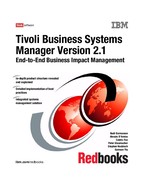130 Tivoli Business Systems Manager Version 2.1: End-to-End Business Impact Management
5.1 Planning overview
Almost all businesses today run on computer systems or intelligent devices that
are complex and varied. They need to be maintained and monitored properly to
ensure optimum performance levels and to minimize prolonged downtime of
system components. This helps maintain an edge over the competition in the
increasingly competitive marketplace.
IBM Tivoli Business Systems Manager provides just such a solution with
end-to-end monitoring of the individual components that make up these systems.
Component status is presented using views designed with the enterprise’s
requirements and operation needs in mind. With these views, collectively referred
to as Business System Views (BSVs), the enterprise can be alerted quickly to
faults in its systems, prompting early corrective actions to be taken to avoid
potential disaster.
This section discusses the planning and preparation necessary for successful
deployment of IBM Tivoli Business Systems Manager. The environment can be a
distributed system, a mainframe system, or the complete enterprise with both
distributed and mainframe systems. We also discuss how to plan and prepare
the implementation of the BSVs.
The following areas must be prepared:
? Personnel
? Hardware specifications
? Network and connectivity
? Data feeds
? Software levels and prerequisites
? Operators and users
? Business system requirements
We will discuss each area in the following sections.
5.2 Personnel
The implementation of IBM Tivoli Business Systems Manager is a complex task
in terms of both implementation time and personnel, requiring close interaction
between the implementation team and administrators.
Everyone involved in implementing the system should read
IBM Tivoli Business
Systems Manager: Installation and Configuration Guide
, GC32-0800.
Chapter 5. Implementation planning 131
Additionally, the
IBM Tivoli Business Systems Manager: Administrator’s Guide
,
GC32-0799 is required reading for both implementers and the system’s
administrators.
Implementation involves various roles:
? Implementation team: Consists of core IT personnel from the enterprise
whose combine their expertise with the information in the
IBM Tivoli Business
Systems Manager: Administrator’s Guide
, GC32-0799 and
IBM Tivoli
Business Systems Manager: Installation and Configuration Guide
,
GC32-0800. They will interface with the services implementation team.
Typical implementation team members are:
– Mainframe system programmer
– Network system programmer
– Database (IMS/DB2) system programmer
– Database (IMS/DB2) administrator
– CICS system programmer
– Job scheduler
– Tivoli Framework administrator
– Network/LAN administrator
– Windows system administrator
? Input providers: Provide input about how to customize and implement various
IBM Tivoli Business Systems Manager functions. The implementation team
may consult them as potential IBM Tivoli Business Systems Manager
operators, but they do not perform software customization. They may be
asked to attend operator sessions. An input provider may be a:
– System operator
– Helpdesk representative
– Business function manager
– Executive assistant
– User representative
– Application designer
– System analyst
– IT manager
– Problem and change coordinator
? Administrators: Maintain IBM Tivoli Business Systems Manager systems on
day-to-day basis. They must read and understand the
IBM Tivoli Business
..................Content has been hidden....................
You can't read the all page of ebook, please click here login for view all page.
